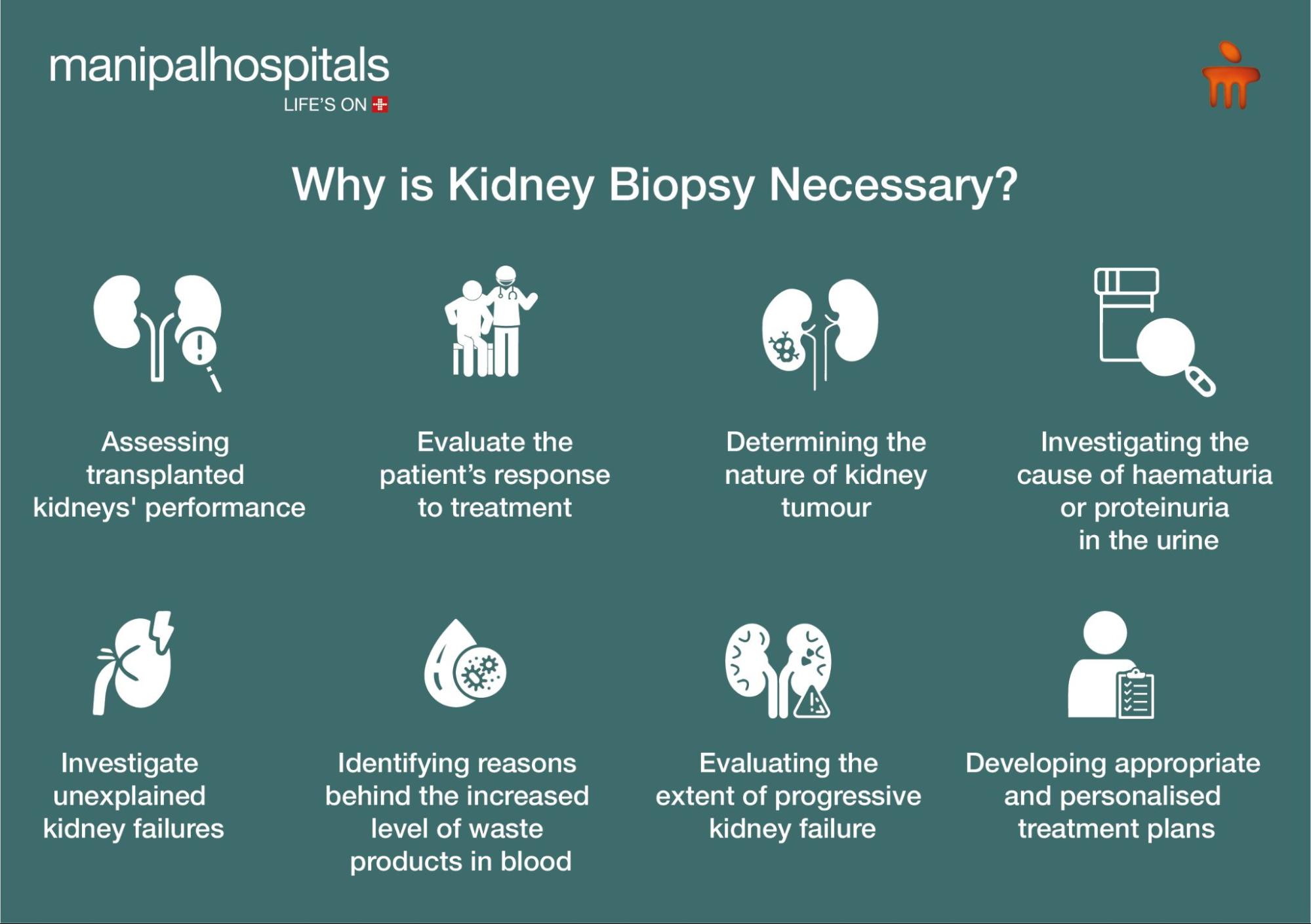
Conditions that affect the kidney, like chronic kidney disease (CKD), have become a serious health concern, especially in low and middle-income countries. With rising risk factors such as diabetes and hypertension, the prevalence of kidney-related issues continues to increase. In India, the number of deaths caused by kidney failure increased by 38% when comparing the period between 2001-2003 to the period between 2010-20131.
Many diagnostic tests exist in the country to effectively diagnose various stages of kidney diseases. This blog focuses on one such essential diagnostic procedure known as a Kidney/Renal Biopsy, delving into its purpose, the detailed procedure, and the potential risks involved.
Purpose of Kidney Biopsy

A Kidney Biopsy test is usually recommended when nephrologists suspect a problem after reviewing your blood or urine tests to obtain a clear diagnosis. Other reasons include:
-
Assessing the performance of transplanted kidneys
-
Confirming whether the patient is responding to the treatment positively
-
Determining whether the kidney tumour is cancerous or non-cancerous
-
Investigating the reason behind the presence of blood (haematuria) or excess protein (proteinuria) in the urine
-
Understand the cause of idiopathic or unexplained kidney failures
-
Identifying the reasons behind the increased level of waste products in blood
-
Evaluating the extent of progressive kidney failure
-
Developing appropriate and personalised treatment plans
The Procedure of Kidney Biopsy
The renal biopsy procedure is performed in a hospital setting, in which the samples are obtained either through a small needle (Percutaneous Biopsy) or while performing surgery (Surgical Biopsy/Open Biopsy). These samples are then subjected to a microscope, aiding pathologists to diagnose the underlying diseases.
Percutaneous Biopsies can be of two types: Fine Needle Aspiration Biopsy, where the small tissue sample is extracted using a thin needle attached to a syringe, or Needle Core Biopsy, where larger samples of kidney tissues are obtained using a spring-loaded needle. On the other hand, open surgeries are recommended based on the severity, overall health, and medical history. The latter is performed if patients have only one kidney or have had problems with bleeding or blood clots in the past.
Pre-procedure
Before a Kidney Biopsy, it is essential to follow specific instructions to minimise the risk of complications during or after the procedure.
General guidelines include:
-
Inform your doctor about any medications you're taking, such as over-the-counter (OTC) drugs, blood thinners, vitamins, and supplements, and avoid certain medications as advised.
-
It is necessary to wear loose-fitting clothes and refrain from wearing jewellery or accessories on the day of the procedure.
-
If anaesthesia or sedation is used, your doctor may advise against driving post-biopsy procedure.
Procedure
The procedure is typically performed by a nephrologist or radiologist. Once you're properly positioned, anaesthesia or sedation is administered to minimise discomfort. Depending on the procedure type—either Percutaneous or Open Biopsy—a tissue sample is collected. In a Percutaneous Biopsy, imaging techniques such as computerised tomography (CT) or magnetic resonance imaging (MRI) may be used to guide the needle. For an Open biopsy, a small incision is made with a surgical scalpel to access the kidney tissue. After the sample is taken, the incision is closed with stitches.
Post-procedure
After the procedure, the patient will be shifted to the recovery room for further observation. Healthcare professionals will closely monitor vital signs and assess the patient's ability to drink and urinate to ensure there are no complications. During your discharge, aftercare instructions are given to ensure a smooth recovery.
The collected samples are sent to a pathology lab, where a pathologist examines them for any abnormalities. These observations are documented, and the results are compiled into a report, which is then sent back to the doctor for further review.
Risks of Kidney Biopsy
Risks that arise during or after the Kidney Biopsy procedure are generally rare, as doctors evaluate every possible cause to confirm none occurs. However, certain complications may manifest, which can include:
-
Infection or pain around the site where the Biopsy is performed
-
Bleeding or swelling around the site
-
Inability to urinate
-
Moderate-to-high temperature fever and chills
-
Passing blood clots in urine or experiencing bright red blood that lasts longer than 24 hours after Biopsy
-
Fatigue
-
Inconsistent results
Conclusion
Kidney Biopsy is a vital diagnostic tool to detect many conditions that affect the kidney. Many advanced minimally invasive procedures, such as Laparoscopic Kidney biopsy are employed, offering several benefits like less scarring, minimal complications, and quick recovery. Additionally, depending on the patient's case, further tests may be carried out post-biopsy to develop an effective treatment plan.
If you or your loved one has been advised to have a Kidney Biopsy or wishes to evaluate the need for one, consider visiting Manipal Hospitals, Patiala, which is considered one of the best hospitals for carrying out this procedure. With advanced state-of-the-art technology and equipment, our nephrologists at Patiala perform the procedure with precision, ensuring accurate diagnosis and effective treatment plans for your condition.
FAQ's
The duration can vary depending on patient factors. However, in most cases, a Kidney Biopsy usually takes an hour.
Anaesthesia or sedation will be administered during the Kidney Biopsy procedure. However, you can expect some pain after the procedure, which can last for a few days. Pain relievers will be prescribed to reduce discomfort and pain while you recover.
The duration of your results generally depends on the urgency of your case. Usually, results for Kidney Biopsy often take three to four days. Our nephrologists will let you know when you can expect your results.
Seek immediate medical attention if you notice any signs of infection, swelling, or discolouration accompanied by fever, blood in the urine for more than 24 hours, difficulty while urinating, pain or burning sensation when urinating, and fatigue.
To schedule an appointment at Manipal Hospitals, Patiala, contact our Nephrology Department or visit our website.



















 5 Min Read
5 Min Read














